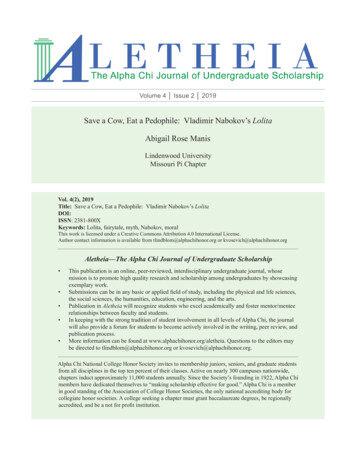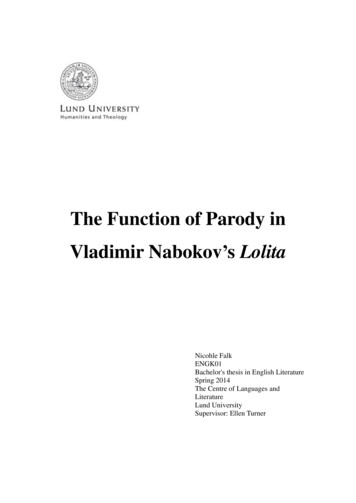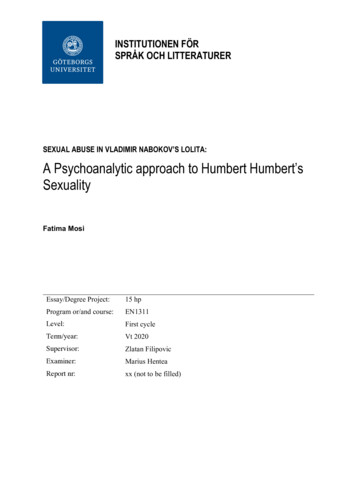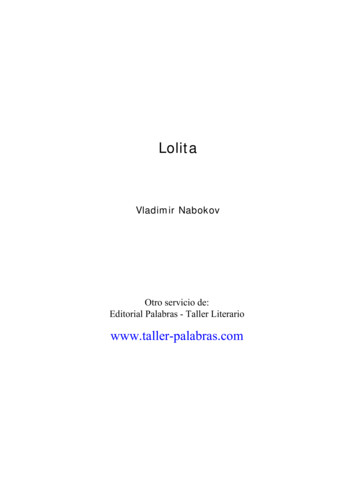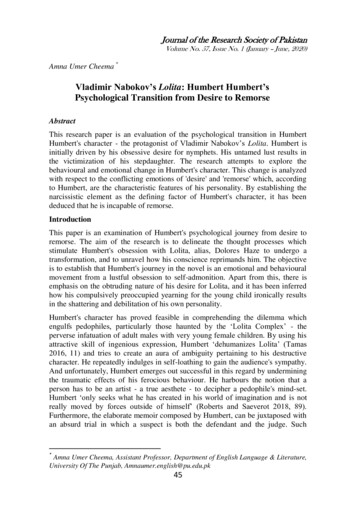
Transcription
Journal of the Research Society of PakistanVolume No. 57, Issue No. 1 (January – June, 2020)Amna Umer Cheema *Vladimir Nabokov’s Lolita: Humbert Humbert’sPsychological Transition from Desire to RemorseAbstractThis research paper is an evaluation of the psychological transition in HumbertHumbert's character - the protagonist of Vladimir Nabokov’s Lolita. Humbert isinitially driven by his obsessive desire for nymphets. His untamed lust results inthe victimization of his stepdaughter. The research attempts to explore thebehavioural and emotional change in Humbert's character. This change is analyzedwith respect to the conflicting emotions of 'desire' and 'remorse' which, accordingto Humbert, are the characteristic features of his personality. By establishing thenarcissistic element as the defining factor of Humbert's character, it has beendeduced that he is incapable of remorse.IntroductionThis paper is an examination of Humbert's psychological journey from desire toremorse. The aim of the research is to delineate the thought processes whichstimulate Humbert's obsession with Lolita, alias, Dolores Haze to undergo atransformation, and to unravel how his conscience reprimands him. The objectiveis to establish that Humbert's journey in the novel is an emotional and behaviouralmovement from a lustful obsession to self-admonition. Apart from this, there isemphasis on the obtruding nature of his desire for Lolita, and it has been inferredhow his compulsively preoccupied yearning for the young child ironically resultsin the shattering and debilitation of his own personality.Humbert's character has proved feasible in comprehending the dilemma whichengulfs pedophiles, particularly those haunted by the ‘Lolita Complex’ - theperverse infatuation of adult males with very young female children. By using hisattractive skill of ingenious expression, Humbert ‘dehumanizes Lolita’ (Tamas2016, 11) and tries to create an aura of ambiguity pertaining to his destructivecharacter. He repeatedly indulges in self-loathing to gain the audience's sympathy.And unfortunately, Humbert emerges out successful in this regard by underminingthe traumatic effects of his ferocious behaviour. He harbours the notion that aperson has to be an artist - a true aesthete - to decipher a pedophile's mind-set.Humbert ‘only seeks what he has created in his world of imagination and is notreally moved by forces outside of himself’ (Roberts and Saeverot 2018, 89).Furthermore, the elaborate memoir composed by Humbert, can be juxtaposed withan absurd trial in which a suspect is both the defendant and the judge. Such*Amna Umer Cheema, Assistant Professor, Department of English Language & Literature,University Of The Punjab, Amnaumer.english@pu.edu.pk45
Journal of the Research Society of Pakistan – Vol. No. 57, No. 1 January – June, 2020behaviour is typical of dangerous offenders who, in order to absolve themselves ofguilt, perpetually resort to pseudo self-justification.Metaphorically, Humbert exemplifies human crookedness, the malevolent andunscrupulous streak, which uses whatever means possible to satisfy its yearnings.Moreover, during the course of his criminal behaviour, Humbert's thoughtprocesses persistently vacillate between gratification of his lust and self-hatred,which adds to the validity of his life-like persona. At various instances in thenovel, Humbert uses his aura to manipulate the less perceptive readers intobelieving that his eventual metamorphosis has no ulterior motives attached to it.Above all, Lolita as a psychological movement 'underlines the essential,inefficient, painstaking and pain-giving selfishness of all passion, all greed- of allurges, whatever they may be, that insist on being satisfied without regard to theeffect their satisfaction has upon the outside world. Humbert is all of us' (Janeway1958).According to the American Heritage dictionary, desire means 'to wish or long for;to want, or the object of one's desire' (2001, 236). 'In desire, we wish to changesomething in ourselves or in our environment or both' (Russell 1989,174). lt isnote-worthy that people, who blindly pursue their desires, often negate theexistence of those around them. Such people are termed as solipsists. 'Solipsism' isa philosophical theory resting on the belief that the self is the only reality.Humbert repeatedly uses this term throughout his narrative, to refer to his abuse ofLolita. For instance, after using her as an aid to masturbation for the first time,Humbert claims that, 'Lolita had been safely solipsized' (Nabokov 1997, 60). Heuses her as a means to satisfy his 'paroxysm of desire' (Nabokov 1997,12).Moreover, as asserted by Bertrand Russell, Humbert wants to model hisenvironment in a way which will compliment his desire. In other words, he wantsto experience sinful bliss, by subverting the will of an innocent and vivaciouschild, without being reprimanded. Tragically, he is able to meet the demands of hiscarnal yearnings by disregarding 'all laws of humanity' (Nabokov 1997, 287).Throughout the narrative, Humbert's utterances are saturated with 'over-elegantlanguage', which alludes to the ' glossy falsity ' of his distorted version of events(Bloom 1987,17). He forms forced associations between prominent literary and artworks and his own plight. One of the most outstanding of these references isHumbert's intermittent insistence on the notion that Lolita is Carmen- theprotagonist of the French opera 'Carmen'. Carmen is a beautiful young gypsy witha fiery temperament. She expresses her love for Don Jose and then deserts him fora bullfighter. Don Jose is unable to cope with Carmen's betrayal and falls prone tomadness. Humbert identifies himself with Don Jose who is portrayed as aninexperienced soldier in the opera and who undergoes a transformation from afaithful lover to an obsessed lunatic. Likewise, Humbert also alleges that Lolita(similar to Carmen) is an extremely cruel nymphet, whereas he is the pitiableabandoned lover who has to undergo much agony and suffering (like Don Jose).Based on the above discourse, Humbert's flamboyant style corroborates with hismalicious intent (of hunting nymphets), which he so easily masquerades in 'thepresence of adults' (Nabokov 1997, 88). Moreover, it can be said with certitudethat Humbert's personality as delineated by him, is similar to the image apparent46
Vladimir Nabokov’s Lolita: Humbert Humbert’s Psychological Transition from Desire from a kaleidoscope, since at various instances he introduces a succession ofchanging patterns of his character. According to him, for most part of his life hehad to veil his craving from the alien world, which to his dismay, led to his'monstrously twofold' existence (Nabokov 1997,18). Thus, like a spy and an'imposter' he struggles to hide his true identity from the environing world (Fowler1974,167) and lives in a perpetual state of anxiety and fear.Humbert superimposes his much-prized private vision on the world around himand transforms everything. There is a disparity between his public and private self.Hence, the abominable monster within him remains undetected by the teachingstaff at Beardsley College, and escapes scrutiny by the attendants at numerousmotels where he indulges in an illicit relationship with his stepdaughter. Heregretfully states that, 'my world was split' (Nabokov I997,18). This is why, PeterRoberts and Herner Saeverot are of the view that Humbert ‘deceives by way ofconcealing’ (2018, 98).However, the unassailable reality is that the relationship between him and Lolita isone of perpetual torment and painful insecurity, which proves to be bitter andutterly unrewarding in the long run. Unwilling confrontation with this blatantincongruity in their relationship, results in a disastrous destruction of Humbert'sillusions thereby cornering him into a psychologically disturbing enclosure, wherehe is ' his own best tormenter' (Sharpe 1991, 64). The only truth acceptable to himis that which ratifies the obtuse nature of his vision. It leads him to the falseconclusion that he has catered to his basest needs 'without impairing the morals ofa minor. Absolutely no harm done' (Nabokov 1997, 62). Due to his profoundconviction in the pride of flesh, he elicits great joy from scenes of vile vulgarity;from illustrations of ' adolescent maidservants . (smelling of crushed daisies andsweat); and from very young harlots disguised as children in provincial brothelsand . the exquisite stainless tenderness seeping through the musk and themud'(Nabokov 1997, 44). This is why, Tony Sharpe has maintained that ' it isdifficult to be sure whether the dreamer or the demon in him (referring toHumbert) has the final word ' (1991, 77).According to Elizabeth W. Bruss, on a metaphorical level, Humbert 's infatuationwith little girls represents his urge to fulfill his dreams coupled with his need torelieve himself of dreadful nightmares. The non-realization of this need pushesHumbert to the brink of 'vengeful guilt and disappointment ' (1987, 34). Humbertis a true dreamer in the sense that he conceives, imagines and thrives on fancifulideas. The moral compass in Humbert is completely shattered by his hauntingdemons to such a degree that obscene mental images of Lolita do not suffice toquench his thirst for the young victim. He longs for an actual physicalconsummation of his dark imaginings, and his night long broodings on devisingplans for hunting Lolita are similar to a 'predator that prefers a moving prey to amotionless one' (Nabokov 1997,42). The truly despicable demonic aspect ofHumbert is highlighted in the preceding utterance, ' I am like one of those inflated. spiders you see in old gardens. Sitting in the middle of a luminous web andgiving little jerks to this or that strand. My web is spread all over' (Nabokov 1997,49). It is note-worthy that despite the obvious examples of Humbert's serpent likenature, critics such as Douglas Fowler have asserted that the most poignant crimecommitted by Humbert is against his 'own ethical sense rather than against Lolita47
Journal of the Research Society of Pakistan – Vol. No. 57, No. 1 January – June, 2020'(I974,165). Moreover, Fowler has also suggested that Lolita is not perturbed byHumbert's violation of her childhood rights. This theory contradicts Humbert'sown narrative in which he has vividly reproduced Lolita 's letter to him, whichends with the following painful statement, 'I have gone through much sadness andhardship '(Nabokov 1997, 266).The reader is provided with the sole stance of Humbert, and based on his record, toformulate a notion conceding that Lolita is not disturbed by Humbert 's abuse,would be an enormous flaw on the interpreter 's part. Humbert does not at anypoint in the novel exemplify the naivety, which is characteristic of children. Whilehis uncompromising desire for Lolita may appear to resemble a child 's fixation onthe object of its desire, the father's manipulation, calculation and abuse of powercannot be paralleled with the purity of child's motives. Moreover, in Humbert'scase, the desire is a sexual one, which serves as a contrast to a child 's innocentyearnings. To pay absolute servitude to his desire, he adopts an expression, whichepitomizes his inclination towards artifice.'A sexually abusive parent is an immature creature, obsessed with selfgratification, for whom others are but players in the drama of his life' (Wade 2002,56). This statement can aptly be applied to define Humbert's psychological state,which predominantly resembles that of an emotional and abusive father. For themost part of the novel, he appears as a functional pedophile who derives anarcissistic pleasure by engaging in repeated sexual encounters with a youthfuland promising target - Lolita. During the course of his recollection he claims thatafter imprisoning Lolita, 'nothing mattered anymore, and everything was allowed'(Nabokov 1997, 268). Contrary to this, Humbert also makes repeated claims that, 'I loved her. It was love at first sight, at ever and ever sight' (Nabokov 1997, 270).This proclamation suggests that for Humbert ‘pedophilia is a routine’ (Tamas2016,13). It prompts one to question if there is an element of love underlyingHumbert's abusive behaviour, and can he be redeemed on the basis of the painfulremorse, which according to him haunts him.It is note-worthy that Humbert is emotionally retarded as far as his relationshipswith the people around him are concerned. His emotional understanding isrestricted merely to his own being. Furthermore, he is a narcissist whose supremequest in life is to achieve self-gratification. The factors which constitutenarcissistic behaviour are: 'vanity, conceit, craving for admiration, a desire to beloved in connection with an incapacity to love others.creative desires, anxiousconcern about intellectual faculties' (Thorpe 1938, 88). One of the most strikingattributes of a narcissist is his yearning to be considered as the absolute loveobject. In the initial section of his memoir, the narcissistic tendencies in Humbertare apparent at various instances. He takes immense pride in the fact that he is astrikingly appealing man who has a seductively captivating effect on women. Suchexaggerated expression of one's physical attractiveness is a manifestation of aninward craving for self-love, which Tristan Gans finds to be ‘trickingpsychologists into thinking he is gay’ (2011).In addition to this, narcissists resort to extreme measures in order to elicitprofound prestige from others, and often times create fantastical illusions in whichthey themselves are the ultimate heroes. Humbert likewise, harbours grandiose48
Vladimir Nabokov’s Lolita: Humbert Humbert’s Psychological Transition from Desire illusions pertaining to his personality. As a ‘nympholept’ (Orozco 2017, 8), hedeclares himself 'an artist, a madman' (Nabokov 1997, 17) who can recognize the'nymphet' (Nabokov 1997, 17) among numerous school children. Furthe
Vladimir Nabokov’s Lolita: Humbert Humbert’s Psychological Transition from Desire 47 from a kaleidoscope, since at various instances he introduces a succession of changing patterns of his character. According to him, for most part of his life he had to veil his craving from the alien world, which to his dismay, led to his 'monstrously twofold' existence (Nabokov 1997,18). Thus, like a .
